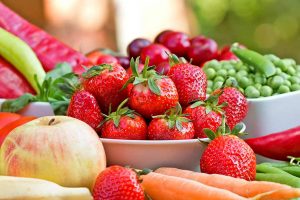
Although we have become obsessed with food in regard to weight loss, food is our nutrition and it provides us with the energy we need to function daily. What is it that food does for us? Food provides the energy and nutrients you need to be healthy. It is only by eating enough of a variety of foods that we get essential nutrition in order to maintain good health. In order to be healthy, we need to consume foods that give us the major categories of nutrition. Those categories are Carbohydrates, Proteins, Fats, Fiber, Water, Minerals and Vitamins. There are many subcategories within those major categories. For instance, the different vitamins and different minerals we all need. But what happens when we don’t get enough of the proper nutrients?
Because of the present obesity and overweight epidemic, it seems that we have lost focus on what foods are good for us and which can cause harm, and we have become over-focused on calories alone.
A nutritional deficiency occurs when the body doesn’t absorb the necessary amount of a nutrient. Deficiencies can lead to a variety of health problems. These can include problems of digestion, skin problems, stunted or defective bone growth, certain cancers and even dementia. We also now know that lack of good nutrition leads to depression. The double edged sword is that if you get sick, your nutritional deficiency can easily become exacerbated. But, healthy eating is not that difficult to do. The key is to:
- Eat a variety of foods, including vegetables, fruits, and whole-grain products
- Eat lean meats, poultry, fish, beans, and low-fat dairy products
- Drink lots of water
- Limit salt, sugar, alcohol, saturated fat, and trans fat in your diet.
In 2015, more than $37 billion dollars worth of supplements were sold in the United States alone (yes, you read this correctly). But this begs the question of whether we really need all these supplements or can we get our nutrition from food alone?
The Modern Diet and Nutritional Deficiency
If you compare today’s diets with those of a hundred years ago, three things stand out.
First, the food categories we eat today are much more identical one to the other. Wheat, corn and vegetable oils make up a huge portion of our diet—the average American consumes over 130 pounds of wheat per year (ERS 2015; Ranum, Peña–Rosas & Garcia–Casal 2014). These three foods or food products, when it comes to high–fructose corn syrup, cottonseed oil, etc., that are rather low in vitamins and minerals, and lack potentially beneficial phytochemicals found in other plants.
Second, we eat a lot more processed foods these days. The simple act of processing a food is not harmful, so pressing olive oil out of whole olives doesn’t make it unhealthy. But when we grind certain foods down to a powder (like wheat flour) and make that a large portion of our diet, we take in a lot of “acellular carbohydrates” Basically, plants and animals have cells, which contain water, but when we eat dried, powdered grains, a lot of acellular carbohydrate enters the gut all at once, which may predispose some people to health issues.
Finally, the plants we eat and the ones animals eat, which become our meat and poultry, grow in soil that is less mineral–rich than it used to be (Davis, Epp & Riordan 2004). And levels of selenium and magnesium can vary widely depending on modern farming practices and natural concentrations. Moreover, roughly half of Americans may be drinking tap water that is low in magnesium and/or calcium. This may be important, given the potential for high–mineral water to help protect against cardiovascular disease (Momeni et al. 2014).
Government Concern for Malnutrition
The Center for Disease Control and Prevention collect vitamin– and mineral–deficiency data every few years. Although several vitamin and mineral deficiencies are somewhat common, as we stated before, four stood out in the last CDC report: vitamin D, iodine, iron and polyunsaturated fatty acids.
Public awareness of these nutrients varies, as vitamin D and omega–3 fatty acids (the latter are a type of polyunsaturated fat) have received substantial attention in the past few years.
Iron deficiency, a well–known issue for women with anemia, is also increasingly a problem in children, especially from lower–income groups. Iodine deficiency often comes up in the context of pregnant women, as iodine is crucial for fetal development (Friedman et al. 2015).
Polyunsaturated fats are more controversial. Foods are increasingly fortified with omega–3 fatty acids, and fish oil is among the most popular dietary supplements. And the CDC report, which measured fatty acids for the first time, showed relatively low levels of polyunsaturated fats, including omega–3s, in several nonwhite population groups (Pfeiffer et al. 2013). Whether or not polyunsaturated fats should jump near the top of our list of important nutrients is debatable however.
We’re also seeing innovative research on deficiencies that cause problems as we age. Much of this research, known as the “triage theory of aging,” falls under the work of Bruce Ames at the University of California, Berkeley. His research shows some of the first examples of the body prioritizing nutrients for survival over longevity (McCann & Ames 2009). When the body isn’t getting optimal nutrient levels, it may prioritize/triage functions essential to life, like keeping the brain and heart working, and deprioritize others that aren’t.
As far as aging, seniors are especially prone to nutrient deficiencies. For example, seniors absorb vitamin B12 less efficiently and produce less vitamin D with sun exposure than younger adults (Andrès et al. 2004; Linnebur et al. 2007).
As you can see, the most important deficiencies. aren’t a single list. They vary depending on who you are.
The question of needing Vitamins or not will be addressed in part 2 of this article. Making sure you get all of the nutrition that you need for good health will “add hours to your day, days to your year, and years to your life.”
Alan Freishtat is an A.C.E. CERTIFIED PERSONAL TRAINER and a BEHAVIORAL CHANGE and WELLNESS COACH with over 19 years of professional experience. Alan is the creator and director of the “10 Weeks to Health” program for weight loss. He is available for private coaching sessions, consultations, assessments and personalized workout programs both in his office and by telephone and skype. Alan also lectures and gives seminars and workshops. He can be reached at 02-651-8502 or 050-555-7175, or by email at alan@alanfitness.com Check out the his web site –www.alanfitness.com US Line: 516-568-5027.
The words of this author reflect his/her own opinions and do not necessarily represent the official position of the Orthodox Union.

